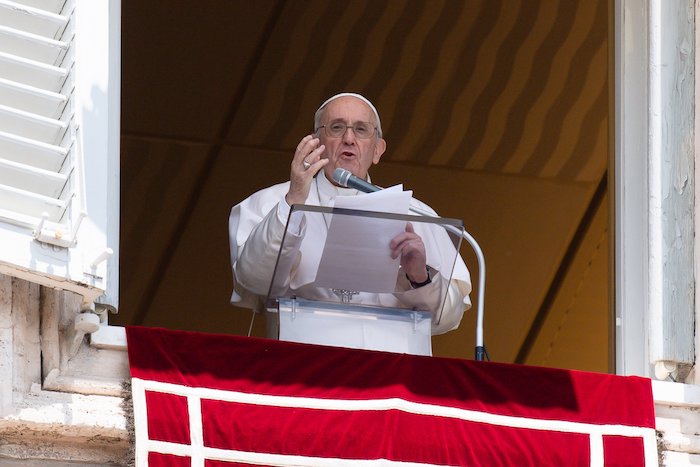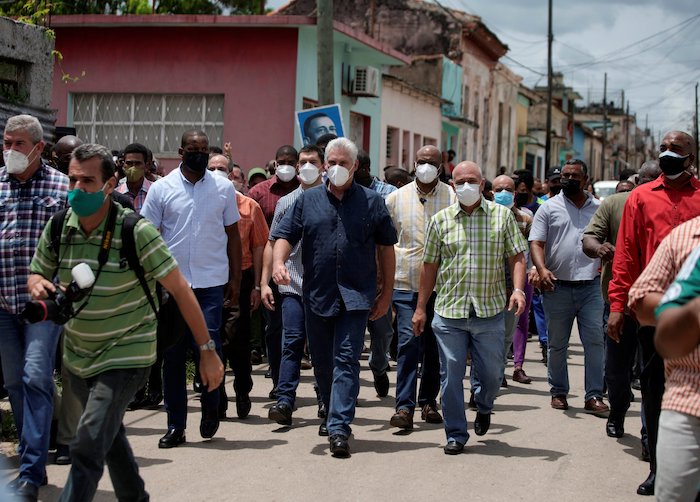By Inés San Martín
ROME — Pope Francis, Sunday, expressed closeness to Cuba in his traditional noontime Angelus address, and he voiced the hope that the country will become more just and fraternal. While those words may elicit only quiet reaction within Cuba itself, a band of Cuban expatriates who gathered in St. Peter’s Square didn’t disguise their anguish.
For safety reasons, as most of those in the square Sunday still have family in Cuba and have themselves already been threatened with not being allowed back into their country, they will be identified only by their first name.

“We are here for the freedom of Cuba because we need a change,” Deborah said, explaining why the group was in the square before the pope spoke. “There are many people missing, and they are not telling the truth.”
“The entire people is under house arrest,” Jonathan said. “People have been locked in their homes by police forces answering to a leader who is afraid of his own people. Cubans, led by the younger generations have woken up, and we kneed for not only the government but also the world, to realize that this could be a turning point.”
“Those of us who are outside are currently being threatened by the government: we won’t be allowed to go back home, and our families might lose what little they have if we even tried to go back,” he said.
On July 11, the perennial pressure cooker that is Cuba exploded, with tens of thousands taking to the streets to protest the regime as they juggle hunger, poverty, fear, lack of freedom, and COVID-19. The government responded in kind, violently repressing the protests and blocking the Internet.
“I am near to the dear Cuban people in these difficult moments, in particular to those families suffering the most,” Pope Francis said Sunday, struggling to resume after those from the island nation broke in cheers when they heard Cuba. “I pray that the Lord might help the nation build a society that is more and more just and fraternal through peace, dialogue, and solidarity.”
It was Pope Francis’ first public appearance since returning from Rome’s Gemelli Hospital on Thursday.
Though political statements are banned in St. Peter’s Square, the Cubans who had gathered on Sunday had flags, were wearing red and blue t-shirts or white ones, a well-known sign representing those who protest Cuba’s Communist regime, and a sign calling for God to “come to us in these moments of anguish, sustain our beloved country, may our nation not fall on mourning. Have mercy of Cuba.”
Since the protests, at least 400 people have been detained by security forces, and many of them have been unable to contact their families, reason why human rights movements are calling their arrests “forced disappearances.” Among those detained are several journalists, both local and international.
The arrests were made by forces aligned with the regime, mostly plainclothes agents who began their raids after the leader Miguel Díaz Canel called on the “communist revolutionaries” to go out and fight those who protested the regime, mostly aged 14-20.

From the Malecón, Havana’s famous seawall near the old city, and replicated in several other cities across the island, videos live-streamed on Facebook showed thousands of people walking and riding bikes along streets while chanting “Freedom!” “Down with Communism!” and “Patria y Vida.” The latter, translated as Homeland and Life, has become a battle cry among activists, as a direct opposition to the Cuban communist slogan of “Homeland or Death.”
Deborah, one of those Cubans gathered to hear the pope Sunday, claimed that Venezuelan soldiers are being deployed in the repression of the people, as the governments of Cuba and Nicolas Maduro have long been close, both ideologically and politically and financially.
“I was not surprised that the people took to the streets because the people are no longer afraid,” Eva said. Despite acknowledging that the fear they feel of the government going after their families for speaking against the regime to a U.S. outlet, Eva said that the Castro brothers and those who support them “have stolen everything from us. Even the right to be afraid.”
“We have too many generations of oppressed people, with teenagers seeing their parents struggle day in and day out,” Eva said. “Those who are still in Cuba, I fear, have nothing left for the State to take from them. [It’s the] reason why it came as no surprise to me that people bravely took the streets.”
Deborah pointed out that even though it’s often said that Cuba offers free education and healthcare to its 11 million inhabitants, this is a “blatant lie: Nothing has ever been free in Cuba. We’ve just been slaves, working for a state that never gave us what was rightfully ours.”
Asked if she feared Pope Francis speaking up could have negative repercussions for Cubans, she said that when all is said and done, “we can’t be afraid anymore.”
“All we wanted was for the pope to have mercy and to intervene because we were able to leave, but our siblings are not living in freedom. Those who are in prison are in inhumane conditions. It’s comforting to know that he didn’t disappoint. The question now is, who will answer his call for the world to help Cuba?”
On Monday, Díaz Canel defined the protesters as “shameful delinquents” denouncing that they were trying to “fracture” his country’s communist revolution. What happened last week was the largest anti-government protests in nearly three decades.
In a televised address the leader who recently succeeded Raúl Castro as the Communist party’s top figure painted the protests as part of a United States-backed, social media-driven plot to overthrow the regime by string up public discontent.
“The approach wasn’t peaceful yesterday,” he said, criticizing the “completely vulgar” behavior of some demonstrators who he accused of throwing rocks at police and destroying cars. Díaz-Canel conceded other protesters had legitimate concerns over food shortages and blackouts, although he blamed those problems on US sanctions.
